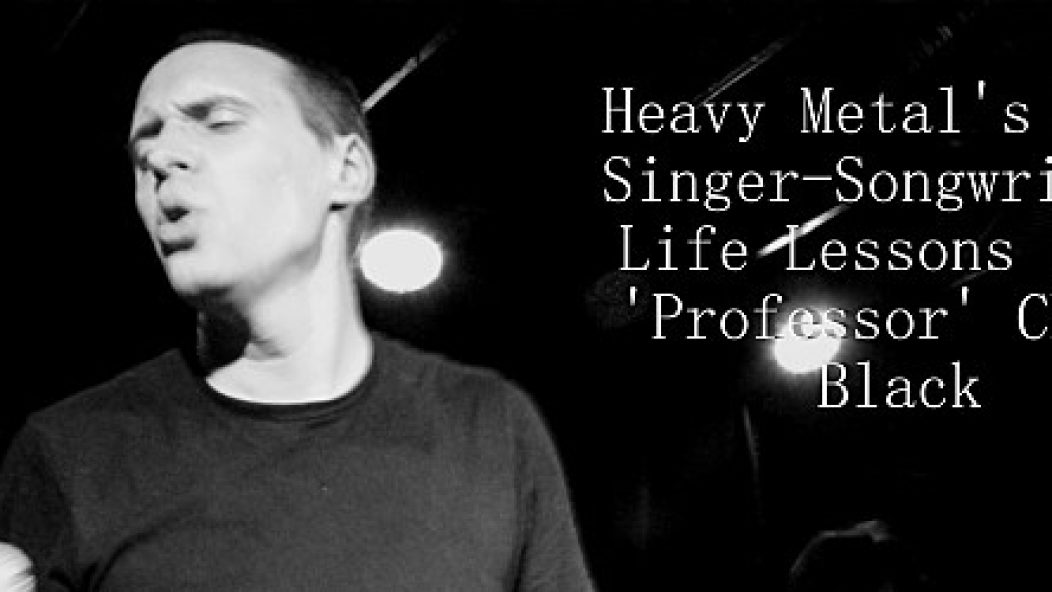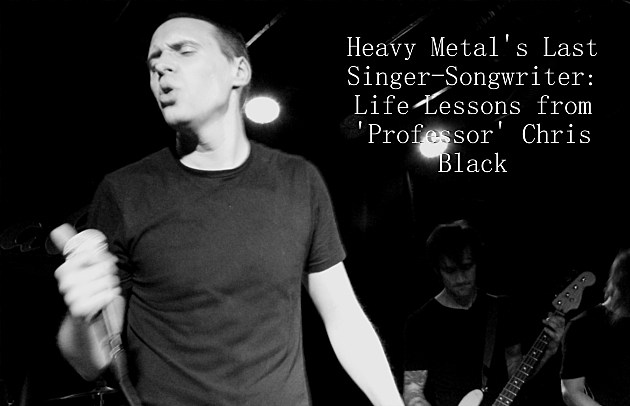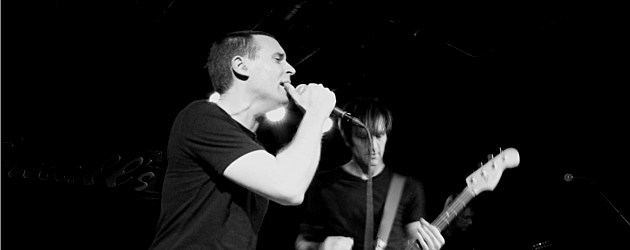
Heavy Metal's Last Singer-Songwriter

…
At first sight, Chris Black doesn’t look like a metal god in the Judas Priest sense. With his slight frame, modest spectacles, and short hair, he more resembles an extra in a Mike Judge film than a man who has dedicated his life to the creation and proliferation of heavy metal music. When I went to interview him at Small’s in Detroit on the first night of his 2014 tour with his band High Spirits, the crowd shuffled right past him. The man they overlooked, however, might be the most dedicated singer-songwriter in heavy metal.
Black recognized me from a previous interview[1] conducted at Lansing, Michigan’s Ogrefest in 2011. At that time, I knew Black more as the man behind Dawnbringer. He had yet to release his debut High Spirits LP, Another Night, which received rave reviews here, among other places. I didn’t think it would be three years before our paths would cross again, but Black says he got more mileage out of High Spirits in Europe and a US tour never materialized. Since then, he’s recorded albums with Dawnbringer, Superchrist, and Pharaoh, as well as a second High Spirits album, You Are Here, which received song premieres on NPR and Stereogum. His label, Hells Headbangers, is so confident in the record their promotional emails boasted the headline, “High Spirits just released the Album of the Year”—it’s not an outlandish statement.
Black records most of his projects by himself—drums, guitar, bass, vocals, the whole kit and caboodle (perhaps this is the origin of his old nickname, ‘Professor’). His music hearken back to the moment in time when heavy metal and hard rock became distinct commercial entities with different audiences. His sound is reminiscent of Rainbow, Thin Lizzy, The Scorpions, and especially UFO. Unlike those bands, however, there is no label-heyday money behind any of Black’s projects, nor is there any virtuosic musicianship. Black can play everything, but only so well. With limited instrumental capability, Black relies on simply writing great songs.
Black and I were led to an impromptu green room set up in a garage behind the venue. The green elbow couch looked like someone had shot a porno on it. The last time we spoke, Black chain smoked Marlboro Reds, but this time he didn’t smoke or drink—Black’s given up the spirits, all of his highs come from music these days. In fact, during the course of the interview he kept nervously looking at his watch, hoping to catch some of Detroit’s own Dark Psychosis, who chose that night as their final gig. It was clear that, despite his appearances, Black is completely fixated on heavy metal.
The obsession began at a young age. “I was raised in a very supportive environment, and financially that’s definitely the case with my parents,” Black said of his early childhood upbringing in New Jersey. “If I wanted guitar or drum lessons they made that happen. They always encouraged me to get a job to support my incredible CD buying habit. They never tried to deflect me; they could tell that heavy metal had its hooks in me from a very young age.”
Around age 10, Black’s parents were transplanted to Philadelphia, where their liberal parenting sensibilities would try to curtail his metal listening for the last time. “I remember coming home around 11, and I had my buddy’s cassette of Coroner’s Punishment for Decadence. When my mom saw the name and the cover it was all ‘uh-uh I don’t think so,’ but I told her to open it up and read the lyrics, and she did. After that they realized I had sense enough.”
Black’s unwavering dedication to the genre has turned out well for him. With four bands, a small label, several albums, and feverish cult following, Black has established himself as a one-man entrepreneur in the heavy metal underground. “I don’t have a day job,” Black said. That fact alone makes him unique among modern independent recording artists, doubly so as a metal musician. “I have a complex of part-time jobs. If I work more-or-less constantly that results in a very modest living,” Black said. He’s made heavy metal not only his life, but his well-being. “Like any job they have their boring aspects and their frustrating aspects—I’ve always been accepting of that because it is all part of my own. I own it. Yes, it gets boring printing out postage labels for huge stacks of CDs and carrying them to the post office, but if i’m going to be doing busywork I would like it to be related to heavy metal. There’s something satisfying about packaging a Harbinger CD and sending it to a fan in Japan, as opposed to mopping the floor at the shop.” When pressed, Black admits that he still receives some royalties from the Nachtmystium songs he penned with Blake Judd. “I make a bit—a very little bit, but I’ll take it!”
…

…
Out of all the musicians involved in last year’s Nachtmystium implosion, somehow Black is the only man who has walked away smelling like a rose. He’s every bit as much a part of the contemporary Chicago scene as those musicians involved in the controversial new Lord Mantis album, but doesn’t exude the same sense of danger that many of his cohorts do, partly because Black seems to know how to keep his mouth shut. He has nothing but pleasant things to say about his contemporaries and home city. “There’s a lot of really motivated musicians [in Chicago]. It’s kind of ground zero for the guy who’s in four bands and three solo projects and they’re all releasing records and playing shows,” he said. “There’s not a lot of talk. It seems like that’s more of an East or West Coast thing. They talk. ‘This is what we wanna do, this is what we’re strategizing.’ There’s a lot of chatter that I don’t think plays as much of a role in Chicago, because everyone’s in the rehearsal room or in the studio or on tour, actually doing it.”
It helps that Black’s projects don’t share the industrial black sludge sound (alternately: the Sanford Parker sound) that has become Chicago’s signature flavor. Even though Dawnbringer and High Spirits may have some depressing lyrics, they seem like an exaltation, not cries for help. “That may relate to the personal lives of the people making the music,” Black is quick to point out. “I’ve been fortunate to not have an especially turbulent life. I’ve had a happy childhood. I’ve never really worried about where my next meal was coming from. I’ve counted myself very lucky. I’ve enjoyed all my opportunities to do creative stuff. I’m grateful that there is an audience for the kinds of things that I do and if that reflects in the lyrics then that’s not surprising. I wouldn’t want to assume anything about any other songwriter or band, or hypothesize about what experiences they might have had. […] I’m not going to pretend to be Mr. Macho, totally hating the world satanic dude because that’s not me. I’m not going to wear a mask for the sake of conforming to what expectations somebody might have for heavy metal music.”
Still, Chicago in particular has become an integral part of High Spirits. Another Night proudly sports the Lakeshore Drive skyline on its cover, and You Are Here‘s (ahem) minimalist sleeve evokes the CTA’s ‘L’ transit map. “It wasn’t based on any specific transit system, we were actually a little paranoid about making it too close to the Chicago CTA map,” Black insists. “But its got all the right colors. ”
Black moved to Chicago after graduating from Penn State. He went there following his then-girlfriend, who is now his wife of 10 years. The fact that Black is married took me aback. How could that be so? Heartbreak. Young love. Wanting. Those are the themes that compose the lyrical content of High Spirits which, at this point in time, might be the band that makes Black famous. Certainly it’s his most accessible music, and also his most emotional, due in no small part to the lyrics in songs like “Where Did I Go Wrong,” “You Make Love Impossible,” and “I Need Your Love.”
“See, I fooled you,” Black chuckled, before rephrasing the answer. “Well, you fooled yourself by assuming the narrator is me.” He doesn’t even especially like lovesick music. “It just fits with the atmosphere I’m trying to create musically. I want High Spirits to be accessible. I want it to be familiar and for people to connect with it instantly, and those types of subjects and lyrics, probably since the dawn of music, have been the ones that grab people, because we can all relate to being brokenhearted or being away from ones we love, or away from where we want to be. We can also all relate to that exhilarating feeling of. . .” Black hesitated. “Falling in love is such a cliché,” said the man with a successful marriage of 10 years. “Getting what we need, getting satisfaction. Those subjects fit naturally with what motivates High Spirits.”
In spite of his lyrical sleight of hand, Black acknowledges that he is a songwriter—a rarity in heavy metal, where many bands write as collaborative entities, or at least the primary creative drivers behind bands stay hidden behind logos and affects. “My main creative function is songwriting. I’m never going to be known for being a great drummer or bass player. I’m definitely never going to be known for being a great singer. Whether I’m known for being a great songwriter is for the future to decide, but that is my concept of myself at this point,” Black said.
…
…
As a person raised in the post-Rolling Stone world of rockist narrative, this confused me at first. How can Black call himself a singer-songwriter and not write autobiographical lyrics? “That’s the component of the singer-songwriter model that I’m not comfortable with, this notion that there’s this unconditional giving of the self. That doesn’t always apply to me,” Black said. “To apply the singer songwriter model to what I do only goes so far […] It is something [being a songwriter] that I have yet to grasp and that I don’t wish to grasp. Time will eventually sever me from my art and all the questions will fall back on you.”
I asked him if he could name any other singer-songwriters in heavy metal. “Blackie Lawless from W.A.S.P.,” he answers instantly. “Maybe Devin Townsend, though I think of him more as a composer.”
Our interview extends beyond the allotted time. By the end, Dark Psychosis are nearly done playing, and Black’s given up most of their last-ever set to speak with me, and I decide not to occupy him further.
Later, Black takes the stage with High Spirits, sans glasses. There the inner metal god shows his place. High Spirits play in matching uniforms—tight black shirts and khaki slacks. His backing band, culled from the members of Zuul, look like they’re loving it, but not as much as Black. He’s animated in a way he was not—or could not be—in our interview. Maybe he needs to become someone else in his writing and performing in order to express himself like this. The first song ends and the crowd is already jumping. “It would appear that we have already reached ‘Full Power’!” High Spirits launches into that song, an obvious fan favorite. His stage banter, like his lyrics, seems to contain some deeper truth. Black is at full power when he’s on stage, even if he doesn’t perform that often.
An hour and one encore performance of “Midnight Sun” later, I say my goodbyes, purchase an LP, and drive home. Before going to sleep, I put on the first W.A.S.P. album. I’m reminded of how great songs like “I Wanna Be Somebody” and “L.O.V.E. Machine” are. There was a time when people pumped out rock music this good all the time. Maybe Black and Lawless are privy to something I’m not, but if they are it’s something rock music in general needs a lot more of. Immediately.
…
1. It’s worth noting that Black is, at times, quite funny. In that first interview I asked him how he managed to record so many albums. “Making music is my second favorite thing to do,” he said. What’s your favorite thing, I asked. At that point he threw down his Marlboro and hollered in my face “What’s your favorite thing to do!?” Touche. ↩
…











